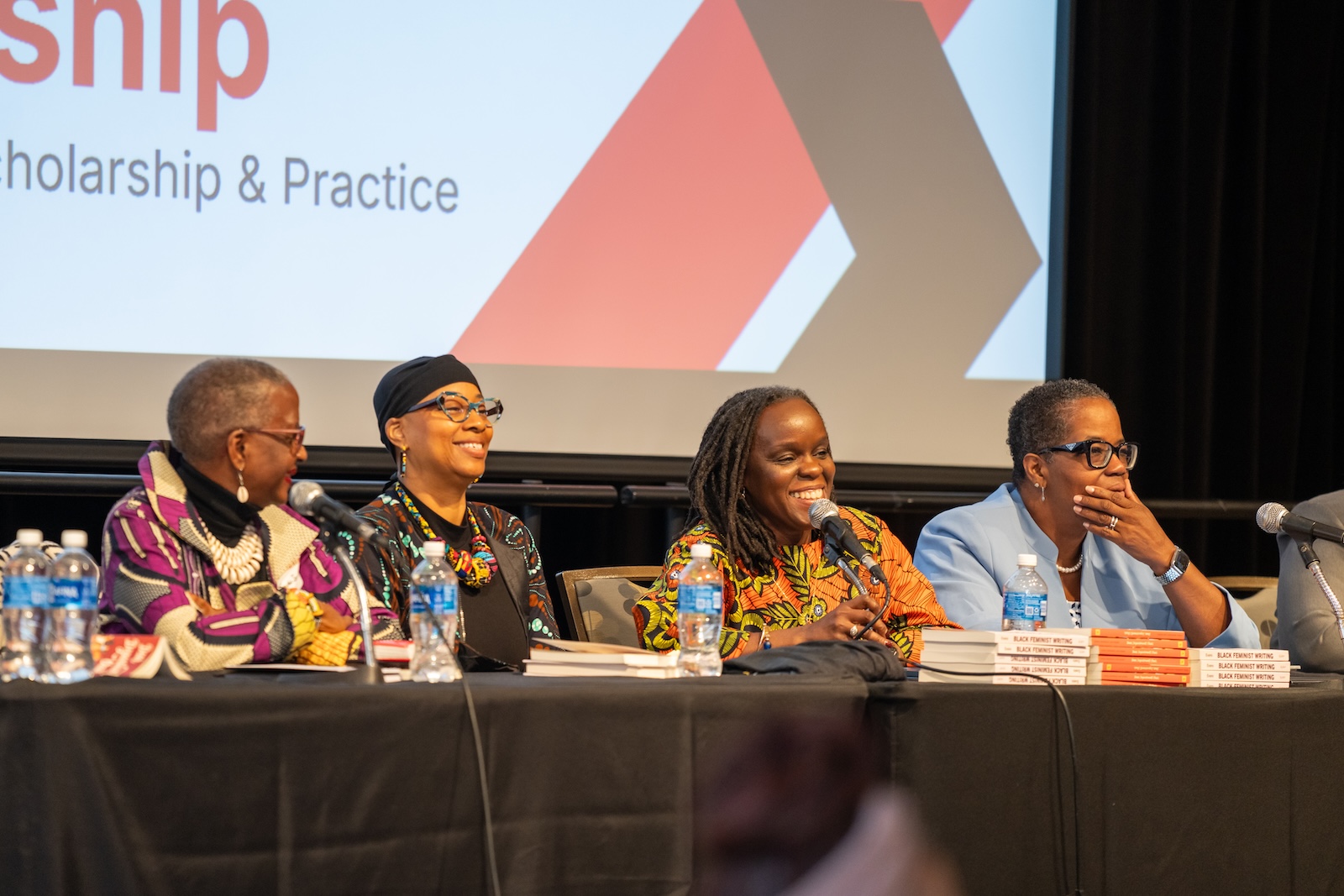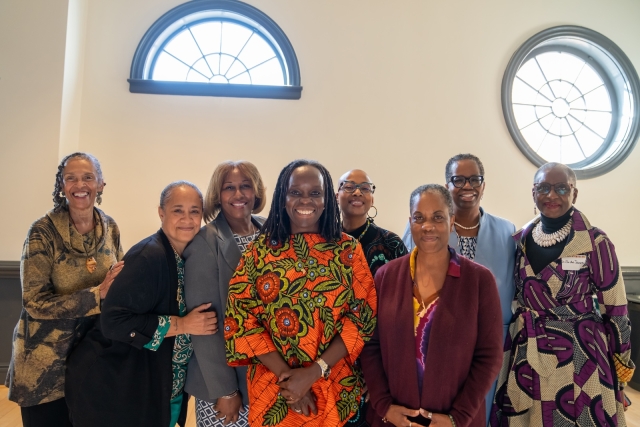Mentorship, Boundaries, Vision: Black Women University Leaders Share Tips for the Next Generation
November 01, 2024

ARHU Dean Stephanie Shonekan and her trailblazing “sister scholars” share guidance and strategies to thrive in leadership.
By Jessica Weiss ’05
In 2015, when the chair of the Black studies department at the University of Missouri abruptly stepped down, Stephanie Shonekan was asked to take the helm. Then a faculty member, she felt daunted by the challenge, but a coalition of senior Black faculty rallied around her, urging her to rise to the occasion. They assured her she was ready and promised their support. So she took the leap.
Within her first year as chair, protests erupted as students voiced frustration over what they felt was the university administration’s failure to address the racial climate on campus, and Shonekan was thrust into a public spotlight. With her colleagues and “sisters” behind her, she found the strength to address the students' concerns, articulate the historical weight of their movement and encourage faculty and administrators to champion the call for change on campus. “Knowing I had a sisterhood behind me, I lifted my head and spoke,” she recalls.
Now the dean of UMD’s College of Arts and Humanities, Shonekan continues to lean on a powerful network of “sister scholars” as she navigates her role. This theme of community support and mentorship is one of the guiding values she highlights in “Dear Department Chair: Letters from Black Women Leaders to the Next Generation,” a book she co-edited to provide up-and-coming and current academic leaders—particularly Black women—with seasoned insights and practical strategies. “This book is not only for Black women,” Shonekan said. “It offers a rare and precious glimpse into the struggles and resilience of women of color in academia.”
At last week’s TerrapinSTRONG Symposium at UMD, Shonekan and several of her co-authors shared key lessons from the book, offering faculty and staff from a range of backgrounds the chance to learn about “inclusive leadership” from prominent voices in academia.
Here are 10 of the tips and insights they shared:
1. Success looks different for everyone
When stepping into a leadership role, it’s essential to “get clear on what season you’re in,” said Julia Jordan-Zachery, chair and professor of women’s, gender, and sexuality studies at Wake Forest University. “Are you a cleanup leader [addressing past issues], a status quo holder, a builder? Each season demands something different.” Jordan-Zachery recommended drafting a vision statement that outlines your own benchmarks for success. “The institution will always have [its own metrics], so I have to define success for myself. For example, my goal is to help people see the best in themselves and to live that out. This makes it easy to see whether my actions align with my vision of success.”
2. True leaders know how to delegate
“As women, we often handle household responsibilities and navigate workplace challenges—sometimes preferring to just do it ourselves,” said Eunice Jeffries, director of government and community affairs at Oakland Community College and member of the Board of Regents at Eastern Michigan University. “But even if it’s easier to do it myself, that’s managing, not leading. So, I try to remind myself of this when it’s time to delegate.”
3. Create space for others
Instead of focusing on climbing the ranks, April Langley, chair and associate professor of African American studies and associate professor of English at the University of South Carolina, prioritizes “building a bridge” for others. “It’s about helping people get to where they need to be… creating space for someone else that maybe you didn’t have,” she said. Stephanie Evans, professor of Black women's studies in the Institute for Women's, Gender and Sexuality Studies and affiliate faculty of Africana studies at Georgia State University, added that inclusive leaders create that space for people with a diversity of backgrounds—including different disciplines, positions, institutional types, and intellectual dispositions.
4. There’s no age limit
Sandra Jowers-Barber, director of the Division of Humanities and Criminology at the University of the District of Columbia Community College, was in her 50s when she earned her Ph.D. from Howard University. “In academia, you can research, write and publish. No one cares how old you are—they care about the quality of your work,” she said. She notes that historian Anna Julia Cooper earned her Ph.D. at 67, and educator Mary McLeod Bethune founded the National Council of Negro Women at 60.
5. Prioritize the unit’s best interests
Stephanie G. Adams, dean of the Erik Jonsson School of Engineering and Computer Science at the University of Texas at Dallas, believes that effective leadership means continually stepping outside of personal interests and asking, “What’s best for the unit I’m leading?” She emphasized, “If we didn’t have students, most of us wouldn’t have a job. While research and service are important, are we regularly considering what’s in the best interest of our students?”
6. Seek out a support network
In 2018, Evans had tenure, a promotion to full professor, and was serving as a department chair at Clark Atlanta University—and she was “sinking.” Together with a colleague at Vanderbilt University, she helped establish the Chair at the Table research collective, a peer-mentoring network for current and former Black women department chairs across the U.S. and Canada, which has become a lifeline. “This network allows us to see ourselves, be seen by others and share resources,” Evans said. She added that she couldn’t have completed her 12 years as chair without the empathy and support of Black women academics who understood the challenges of the role.
7. Find a mentor
“If you don’t have a mentor you can go to with anything—personal, professional, whatever—I feel for you,” Adams said. “And your homework is: start cultivating that. Because as people of color, as women, they come for us all the time. You need a safe space to land.”
8. Feel your feelings
Some days, you may come home feeling defeated, said Jordan-Zachery: “On those days, I have to allow myself to feel that. We tend to run from our feelings, but feelings aren’t bad. I always say, be curious about what you’re feeling and let it inform you. If dissatisfaction keeps surfacing, ask what it’s trying to tell you and what you want to do about it.”
9. Prioritize self-care and set boundaries
“Advocating for others should never come at the expense of your own wellbeing,” said Langley, who emphasized the importance of mental wellness, including finding a counselor or therapist if needed. Adams added that setting and keeping boundaries is essential to protecting your peace. “My office knows I don’t do Tuesday night meetings because Tuesday night is massage night; they don’t even ask anymore. Set your non-negotiables and stick to them.”
10. Know when to leave
Staying in a role or at an institution too long can ultimately harm your wellbeing, said Jordan-Zachery: “We often overstay and end up causing harm to ourselves, then have to go and repair ourselves because no one else will, especially when we’re already on the margins.” She added: “Leaving isn’t a failure. In fact, sometimes it’s your biggest success.”
Main image (from left to right): Sandra Jowers-Barber, Stephanie Evans, Stephanie Shonekan, Stephanie G. Adams. Photo by Taneen Momeni.


